#ENDViolence – UNICEF launches a campaign, advocating for positive parenting to replace violent discipline
Despite the fact that 69% of the Lebanese know it’s harmful to hit a child, more than 6 in 10 children are still subjected to violent discipline every month, across Lebanon. UNICEF is calling on all stakeholders; government, non-government organizations, community- and religious leaders as well as caregivers, to advocate for positive discipline, free of violence.
In line with a global initiative, UNICEF, on World Day against Child Labour, is launching an #EndViolence campaign, focusing on positive parenting and alternative discipline methods – at home, school and at community level – to ensure what is a collective responsibility, namely a healthy development of children.
The campaign tagline, “I want to raise you without violence”, urges all members of society to come together to ensure children live in a safe environment, free of violence where their rights are met and where children are given a chance to thrive and achieve their full potential.
“Ending violence against children is in everybody’s interest – every child has the right to grow up safe from harm. That is why families, schools and communities need to use alternative discipline and become more positively involved in children’s lives,” says Tanya Chapuisat, UNICEF Lebanon Representative.
“Language mirrors society, it reflects how we think and act. So eventually, UNICEF wants to bring back the true meaning of the words “I’ll teach you a lesson” – away from a violent punishment into raising with love and care”.
All forms of violence, regardless of nature and severity, are harmful to children and a violation of their fundamental human rights. Also, there is significant evidence that violence affects children’s physical and mental health, impairing their ability to learn and socialize as well as transition to adulthood.
Violence as part of raising children is a common practice in several Lebanese communities, rich and poor, and often becomes the norm. For many children, violence wears a familiar face – namely of a family or a household member. That is why it’s often approved of, with people turning a blind eye or failing to report it due to fear or stigma.
“UNICEF can’t do this alone, we’re working together with four ministries, donors and a number of child protection organizations to right this wrong. Together we can talk openly about it, change norms and end violence against children”, says Chapuisat.
According to a 2016 UNICEF Household Survey, over 57% of children living in Lebanon aged 1-14, from diverse socio-economic backgrounds and across all religions and cultures, experience a form of violent discipline, be it physical or psychological, from a parent or caregiver. Since violence is often tolerated or hidden from public view, the numbers are unlikely to reflect the true magnitude of the issue.
The launch included a panel discussion headed by UNICEF and the Lebanese ministries of Social Affairs, Education and Higher Education, Public Health and Justice. Minister of Social Affairs, Pierre Bou Assi stressed on the ministry’s strategy to strengthen child protection in Lebanon, in line with the Convention of the Rights of the Child.
“We know for a fact that children who experience violent discipline have lower odds of reaching some social-emotional development milestone, and that violence undermines their sense of self-worth and dignity. Acting on that knowledge is up to all of us as a society, to make violent discipline in children’s upbringing a thing of the past,” Mr. Bou Assi stated.
The launch was attended by child protection sector representatives, partners and key donors including the Delegation of the European Union and the embassies of the United Kingdom, Canada and Denmark.


